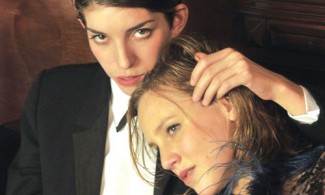Gigola (Laure Charpentier, 2010): France
Reviewed by Richard Feilden. Viewed at the Santa Barbara Film Festival 2011.
 Hollywood prostitutes, as we know, come blessed with hearts of gold. They’ll help you pay for damages to Dad’s Porsche and send you on your way to Princeton, or wow your business partners then defrost your heart so you can whisk them off like fairy-tale princesses. Not so with the Parisian lady of the night featured in Gigola. Here, the hooker quickly develops into an immaculately dressed ice-maiden, breaking both hearts and noses as she plies her trade. Unfortunately the film shares much with its protagonist: it’s all style with little emotional depth to offer.
Hollywood prostitutes, as we know, come blessed with hearts of gold. They’ll help you pay for damages to Dad’s Porsche and send you on your way to Princeton, or wow your business partners then defrost your heart so you can whisk them off like fairy-tale princesses. Not so with the Parisian lady of the night featured in Gigola. Here, the hooker quickly develops into an immaculately dressed ice-maiden, breaking both hearts and noses as she plies her trade. Unfortunately the film shares much with its protagonist: it’s all style with little emotional depth to offer.
The film starts with an interesting enough premise. Before taking the name that gives the film its title, Gigola (Lou Doillon) embarks upon an affair with a female teacher, but her foray into forbidden passion is cut short by her lover’s suicide. Gigola shuts down her emotions, retreating into the Paris underworld where she prostitutes herself and others to rich woman. She’s a high class, cross dressing hooker, good enough at her job to be lavished with cars and jewelry by her doting clientele. Her father is an opium fiend who is bleeding her mother’s inherited fortune dry, one of the girls who works in her club is teetering on the edge of insanity, and a local gangster or two have issues with her lesbian-pimp status. It all sounds like a recipe for either a fascinating character study, or a bawdy, violent romp. It’s neither.
The problems really revolve around the lead, though whether the blame lies with the actor or writer/director Laure Charpentier is unclear. I’m tempted to think the latter. Gigola’s emotional shut-down is too complete. After the loss of her first love, nothing seems to really touch her. Outside of a couple of angry outbursts, we’re given little to reveal any inner turmoil in the character. Were this presented as a front, behind which some deeper being still lurked, the film would have held more power, more sway over my emotions. Alternatively, had her increasing hardness made her a figure of tragedy, her isolation leading her into darker, more dangerous places, then she might have had the power to hold attention. Instead, she’s a Teflon shadow. Events occur around her, through her, but they never touch her, the aftermath never sticks to her. Relationships end, people die, nothing changes. The film’s final act of isolation should be heart-wrenching, but with Gigola’s armor not even tarnished, let alone breached, by loss, it becomes just another trifle. She walks away not a mortally wounded creature, but exactly the same woman she was an hour before.
This air of detachment, perhaps of blandness, permeates the rest of the film. The film has its moments of nudity, yet they neither titillate nor disgust. Violence happens, but it is neither exciting nor its impact felt. The space does leave you time to think, but the film raises too few questions to fill its hollow center. Perhaps it is a Hollywood hooker’s story after all.
Alternative film recommendation: Or
About this entry
You’re currently reading “Gigola (Laure Charpentier, 2010): France,” an entry on Student Film Reviews
- Published:
- 02.13.11 / 1pm
- Category:
- Films, Santa Barbara Film Festival 2011
No comments
Jump to comment form | comments rss [?] | trackback uri [?]